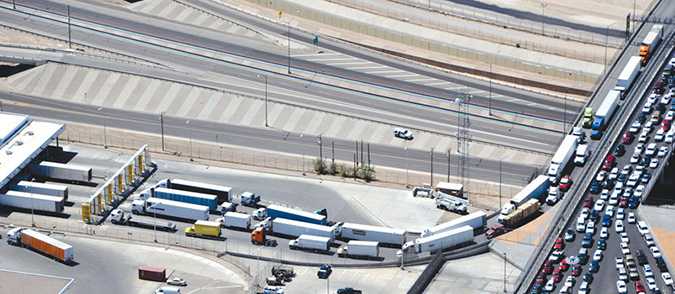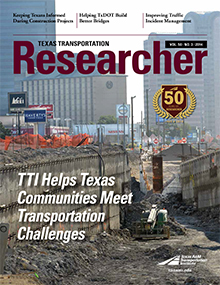Getting goods to market incurs costs for manufacturers, costs inevitably passed on to consumers. But if manufacturers paid less through expedited shipping practices, consumers could benefit too.
Researchers with the Texas A&M Transportation Institute’s (TTI’s) Center for International Intelligent Transportation Research have studied how goods are shipped from maquilas (Spanish for “manufacturers”) in Ciudad Juarez, Mexico, to their distribution centers in El Paso, Texas. Is it possible to cut down shipping times — much of which is spent waiting at the border for inspection by U.S. Customs and Border Protection (CBP) — without compromising security? The project was conceived by the County of El Paso and implemented by Transcore and Secure Origins, with TTI providing technical oversight.

For the past two years, TTI researchers assisted the County of El Paso in the implementation and monitoring of a federally funded demonstration project to monitor and track shipments originating in Ciudad Juarez from a command center in El Paso via technologies like video cameras and GPS. One example of how the system helped to ensure security is if a trailer’s doors were opened along the route, an alarm would sound at the command center. When that occurred, the command center would investigate the incident and, if warranted, notify CBP.
“Essentially, we tracked nearly 25,000 commercial shipments and over 400 hazmat shipments traveling from Mexico to the United States,” explains TTI Associate Research Scientist Roberto Macias. “Not a single security breach occurred over the life of the project.”
This successful demonstration project shows that trucks can be confidently secured from their points of origin in Mexico until they reach their U.S. destinations. What comes next in terms of concept implementation is up to the industry and CBP to decide. While the monitoring system was validated by the project, its component equipment has, for the moment anyway, proven cost prohibitive in the short term.
For the long term, numerous benefits have come out of the project. For example, shippers and carriers now have a set of best practices to follow if and when such a system is actually deployed. And the project enabled Mexican manufacturers and trusted carriers to develop a closer working relationship with CBP, which can only facilitate such collaborations in the future.
“TTI’s expertise was vital in successfully testing a systems engineering approach to facilitating trade without compromising security,” explains Bob Geyer, transportation manager for El Paso County, sponsor of the project. “We’ve got the template. Now what we need is a cost-effective way to implement it.”
